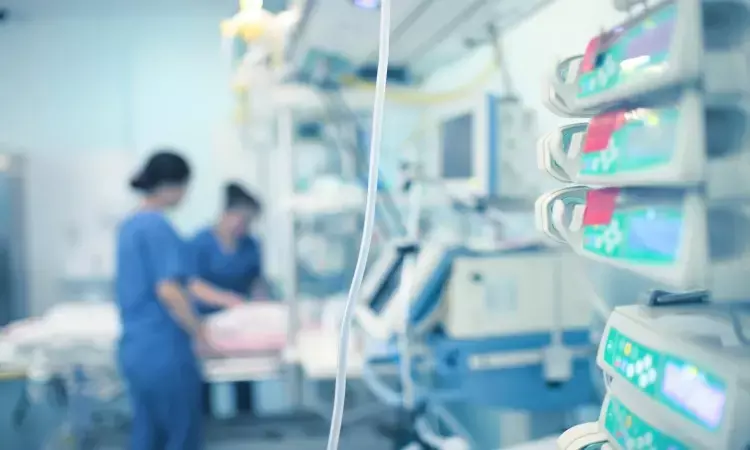- Home
- Medical news & Guidelines
- Anesthesiology
- Cardiology and CTVS
- Critical Care
- Dentistry
- Dermatology
- Diabetes and Endocrinology
- ENT
- Gastroenterology
- Medicine
- Nephrology
- Neurology
- Obstretics-Gynaecology
- Oncology
- Ophthalmology
- Orthopaedics
- Pediatrics-Neonatology
- Psychiatry
- Pulmonology
- Radiology
- Surgery
- Urology
- Laboratory Medicine
- Diet
- Nursing
- Paramedical
- Physiotherapy
- Health news
- Fact Check
- Bone Health Fact Check
- Brain Health Fact Check
- Cancer Related Fact Check
- Child Care Fact Check
- Dental and oral health fact check
- Diabetes and metabolic health fact check
- Diet and Nutrition Fact Check
- Eye and ENT Care Fact Check
- Fitness fact check
- Gut health fact check
- Heart health fact check
- Kidney health fact check
- Medical education fact check
- Men's health fact check
- Respiratory fact check
- Skin and hair care fact check
- Vaccine and Immunization fact check
- Women's health fact check
- AYUSH
- State News
- Andaman and Nicobar Islands
- Andhra Pradesh
- Arunachal Pradesh
- Assam
- Bihar
- Chandigarh
- Chattisgarh
- Dadra and Nagar Haveli
- Daman and Diu
- Delhi
- Goa
- Gujarat
- Haryana
- Himachal Pradesh
- Jammu & Kashmir
- Jharkhand
- Karnataka
- Kerala
- Ladakh
- Lakshadweep
- Madhya Pradesh
- Maharashtra
- Manipur
- Meghalaya
- Mizoram
- Nagaland
- Odisha
- Puducherry
- Punjab
- Rajasthan
- Sikkim
- Tamil Nadu
- Telangana
- Tripura
- Uttar Pradesh
- Uttrakhand
- West Bengal
- Medical Education
- Industry
Consensus on use of inotrope in critically ill patients

Delhi: A group of 42 international European Society of Intensive Care Medicine (ESICM) experts have formulated eleven strong recommendations for the use of inotrope in critically ill patients. The guideline is published in the journal Annals of Intensive Care.
Treatment decisions on critically ill patients with circulatory shock lack consensus. In an international survey, Thomas W. L. Scheeren, University of Groningen, Groningen, The Netherlands, and colleagues aimed to evaluate the indications, current practice, and therapeutic goals of inotrope therapy in the treatment of patients with circulatory shock.
For the purpose, an anonymous web-based survey on the use of cardiovascular drugs was made accessible to members of the ESICM. A total of 14 questions focused on the profile of respondents, the triggering factors, first-line choice, dosing, timing, targets, additional treatment strategy, and suggested effect of inotropes. In addition, a group of 42 international ESICM experts was asked to formulate recommendations for the use of inotropes based on 11 questions.
Recommendations include:
Inotrope Indications
- Inotropes are indicated in septic shock
- Inotropes are indicated in cardiogenic shock
- Inotropes are NOT indicated in hypovolemic shock
Choice of Inotrope
- Dobutamine is the first-line inotrope
- Dopamine is NOT a recommended inotrope
Triggers
- Low cardiac output is a trigger for inotropic treatment
- Signs of hypoperfusion are a trigger for inotropic treatment
Targets
- Low cardiac output is a target for inotropic treatment
- Signs of hypoperfusion are a target for inotropic treatment
Dosing should be lowered or stopped when
- Patients experience unacceptable side effects
- Patients show clinical improvement
"Inotrope use in critically ill patients is quite heterogeneous as self-reported by individual caregivers. Eleven strong recommendations on the indications, choice, triggers and targets for the use of inotropes are given by international experts. Future studies should focus on consistent indications for inotrope use and implementation into a guideline for circulatory shock that encompasses individualized targets and outcomes," concluded the authors.
"Current use of inotropes in circulatory shock," is published in the journal Annals of Intensive Care.
DOI: https://annalsofintensivecare.springeropen.com/articles/10.1186/s13613-021-00806-8
Dr Kamal Kant Kohli-MBBS, DTCD- a chest specialist with more than 30 years of practice and a flair for writing clinical articles, Dr Kamal Kant Kohli joined Medical Dialogues as a Chief Editor of Medical News. Besides writing articles, as an editor, he proofreads and verifies all the medical content published on Medical Dialogues including those coming from journals, studies,medical conferences,guidelines etc. Email: drkohli@medicaldialogues.in. Contact no. 011-43720751


